Process Debated for Platt Road, Act 88 Funds
Washtenaw County board of commissioners meeting (Feb. 19, 2014): A broad community planning process for the future of Platt Road property owned by Washtenaw County is moving forward, after the county board approved a set of recommendations made by a citizens advisory group.
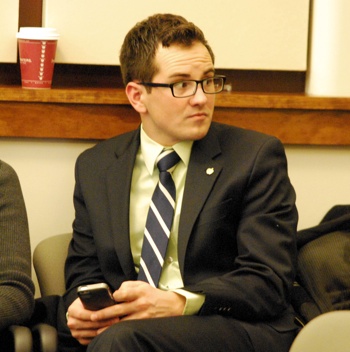
Jason Morgan, director of government relations for Washtenaw Community College, was appointed to the county’s community action board during the Feb. 19 meeting of the county board of commissioners. (Photos by the writer.)
The vote was unanimous, but came after Ronnie Peterson (D-District 6) raised concerns about the affordable housing component of the project. The planning process will use a $100,000 grant from the Michigan State Housing Development Authority (MSHDA), with a stipulation that planning for the 13.5-acre property – south of Washtenaw Avenue – include consideration of affordable housing.
When debate was cut short through a procedural move, Peterson criticized commissioners for not spending more time on the topic – though it had been discussed at length during the board’s Feb. 5, 2014 meeting. Andy LaBarre (D-District 7), who is helping to lead the project and who serves as chair of the board’s working sessions, indicated support for discussing it further at an upcoming session.
Peterson also voiced concerns about a new Act 88 advisory committee, which resulted in a postponement of the first appointment to that group until March 19. The committee had been created at the board’s Nov. 6, 2013 meeting, as part of a broader policy to help the board allocate revenues levied under Act 88 of 1913. No appointments have been made, however. The county levies the tax to fund economic development and agricultural activities, including Ann Arbor SPARK.
As he has in previous board discussions, Peterson expressed concern that the board was abdicating its responsibility to allocate funding. Other commissioners assured him that the committee will deliver recommendations, but the board retains authority for making the allocations.
In other action, the board gave authority to the Washtenaw County clerk/register of deeds office to reduce the fee for expediting marriage licenses under certain circumstances – from $50 to 1 cent. The vote came over dissent from Kent Martinez-Kratz (D-District 1), who argued that fees should be applied equally to all applicants – whatever the amount. He also didn’t think the criteria for applying the waiver were clear. County clerk Larry Kestenbaum cited some examples of when this fee reduction might be used. As one example, he noted that the vital records office anticipates moving later this year to the space where the deeds office currently is, so the office will likely be closed for more than three days.
Kestenbaum also reported that last year, his office had anticipated that a lot of people would want to get married right away because of a possible change in the state’s same-sex marriage law. He said he announced at that time that he intended to waive the fee, but “my authority to do that has been questioned.” He subsequently looked at the state statute, which requires a fee to be set by the county board and charged – whether it’s $5, or $50, or 1 cent. “It’s your authority to do this,” he told commissioners.
During the Feb. 19 meeting, commissioners also gave final approval to create a new dental clinic in Ypsilanti for low-income residents, and heard public commentary regarding the importance of the GED (general education diploma).
Updates and communications included news that the Sharon Township board of trustees had passed a resolution urging the board to keep the road commission as an independent entity. At the county board’s Oct. 2, 2013 meeting, commissioners had created a seven-member subcommittee to “explore partnerships and organizational interactions with the Washtenaw County Road Commission.” State legislation enacted in 2012 opened the possibility of absorbing the road commission into county operations, which would give county commissioners direct control over funding and operations now administered by the road commission.
However, it’s unlikely that will happen. During a 2.5-hour meeting on March 1, the subcommittee voted to recommend that the duties and responsibilities of the road commission should not be transferred to the county board of commissioners. Alicia Ping (R-District 3), who chairs the subcommittee, told The Chronicle that she’ll be bringing the recommendation to the board at its meeting on March 5.
Planning for Platt Road Site
At their Feb. 5, 2014 meeting, commissioners had given initial approval to a broad community planning process for the future of Platt Road property owned by Washtenaw County. The Feb. 19 agenda included a vote giving final approval to a set of recommendations made by a citizens advisory group.
The 13.5-acre site at 2260 and 2270 Platt Road formerly housed the juvenile center. The advisory committee, which was created by the board on Sept. 18, 2013 and met three times late last year, recommended that the county use a $100,000 grant from the Michigan State Housing Development Authority (MSHDA) to fund a community design process for the property.
The committee recommended that the county keep the property until a design process is completed, according to a committee report. Specifically:
The CAC identified through consensus a number of principles that could apply to the site including demonstration for green technologies and sustainable design, mixed use, mixed income including affordable and moderately priced housing, minimized parking spaces, alternative transit, varied types and forms of housing for people of different ages, an urban village, less impervious surface, lower auto footprint, integration with neighborhood, visionary design, draws people to the site, opportunities to grow businesses, and connections to County Farm Park. In order to fit into its surroundings, the final composition of this site should serve to transition from the commercial aspects of Washtenaw Ave., the residential aspects of the local neighborhoods and the natural aspects of the County Park facility. Finally, it should incorporate uses that reflect its value as a county property and bring the opportunity of use or value for all Washtenaw County residents.
The resolution directed the advisory committee to provide more detailed analysis and recommendations by Sept. 31, 2014.
Committee members are: Ron Emaus, Jeannine Palms, Vickie Wellman, Rob Burroughs, Amy Freundl, Pete Vincent, Christopher Taylor (Ann Arbor city councilmember), and Jennifer Hall (Ann Arbor housing commission director). Also serving on the committee were Washtenaw County staff members Meghan Bonfiglio of the county parks & recreation commission; Greg Dill, director of infrastructure management; and Mary Jo Callan, director of the office of community & economic development. County commissioners on the committee are Yousef Rabhi and Andy LaBarre, who both represent districts in Ann Arbor.
Debate on the resolution at the board’s Feb. 5 meeting had focused on a resolved clause that would commit the county to using a portion of the property for affordable housing. At that meeting and on Feb. 19, the board was acting on the assumption that including affordable housing was a condition of accepting the $100,000 planning grant from MSHDA. The grant is part of a $3 million federal grant awarded to the county in 2011 and administered by the county’s office of community & economic development (OCED).
A resolved clause stated:
BE IT FURTHER RESOLVED that the Board of Commissioners directs the CAC to assist in hosting an intensive multi-day community design process to create a plan for the site, inclusive of affordable housing;
However, Callan subsequently informed LaBarre via email on Feb. 27 that the $100,000 planning grant would not need to be repaid if the county decides not to use that property for affordable housing. From Callan’s email:
MSHDA, like HUD, typically has a claw back provision for funds that aren’t used for their intended purpose. In this case, the purpose of the MSHDA funding is to match/complement the $3,000,000 competitive HUD Sustainable Communities Planning Grant awarded to the county in 2011, and more specifically for a community design process that will result in affordable housing. To our surprise, MSHDA recently informed us that, because the funds were awarded for professional services to conduct planning, as opposed to acquisition, we would not be required to pay them back if the community design process doesn’t result in affordable housing development. MSHDA did reaffirm that the expectation to advance affordable housing as a part of larger community sustainability principles remains in place (though payback would not be required).
In her email, Callan included a reminder that the $3 million HUD grant clearly sets affordable housing as a priority, especially along the Washtenaw Avenue corridor. She included a copy of the grant application abstract in her email:
Washtenaw County is the perfect case study to address social equity issues through affordable housing choices, transportation, economic opportunities and healthy food access. Washtenaw County, Michigan is applying for $3,000,000 in HUD Community Challenge Planning Grant (CCPG) funds as the lead applicant in collaboration with several municipalities, the State of Michigan, non-profit agencies, private businesses, and educational institutions. This project focuses on the urbanized areas of Washtenaw County, with the goal of removing barriers to create a coordinated approach to expanding existing affordable and energy efficient housing options and connecting them to job centers and healthy food through an enhanced multi-modal transportation corridor.
Washtenaw County is primarily a rural county by land area. However, about 64% of the residents in Washtenaw County live in the urban core which runs from Ann Arbor (the largest City) to Ypsilanti (2nd largest City) connected by Washtenaw Avenue, a state trunk-line and business loop which runs seamlessly through Pittsfield and Ypsilanti Townships. This corridor is the busiest road in the County, with the greatest number and diversity of businesses, yet offers few housing options directly on the corridor and mostly low-density neighborhoods near the corridor. This proposed project would rectify the disparity between isolated segments of our community. It would provide a catalyst to set into motion renewed revitalization efforts with green building practices; increased energy efficiency and reduced housing costs in rental housing, and enhanced connections to job centers for low-income and working class residents by strengthening public transit and non-motorized options along the Washtenaw Corridor.
Planning for Platt Road Site: Public Commentary
Marian Laughlin, a board member of Religious Action for Affordable Housing (RAAH), hoped that the county would move forward with the study of using a portion of the Platt Road property for affordable housing. She hoped the vote that night would initiate a community planning process “that will lead to the thoughtful development of this very central property.” She knew the community advisory committee had discussed the issue, and she hoped that the conversation would become even broader to make people more aware of the issue and of how the county can contribute to increasing the affordable housing stock.
Laughlin described RAAH as a group that worked through the religious congregations in the entire county to increase awareness about housing issues, and that raises funds to support agencies that create affordable and supportive housing. Her colleagues on the RAAH board had urged her to come and speak to commissioners in support of using part of the Platt Road property for affordable housing.
Yousef Rabhi (D-District 8) thanked Laughlin for her comments, and noted that he also serves on the RAAH board.
Planning for Platt Road Site: Board Discussion
Ronnie Peterson (D-District 6) asked for this item to be pulled out of the agenda for separate consideration. He said he appreciated the advocacy for affordable housing in the Washtenaw Avenue area. His concern was about the cost to the county. He asked for some explanation about what the next steps would be, saying he had several questions about the process.
Peterson then criticized the previous board action to relinquish control of the Washtenaw Head Start program. [That decision was made in late 2011 after considerable debate. The Washtenaw Intermediate School District is now administering the local Head Start program.]
County government should support programs that help children, Peterson said, as well as affordable housing. But the county should be involved in affordable housing through partnerships, he added – it shouldn’t get into the affordable housing business. He said he supported Andy LaBarre’s efforts on the Platt Road property, but he pointed out that the argument for stopping support for Head Start had been that it wasn’t a core service for the county. The same is true for affordable housing, he noted.
The process being used on the Platt Road property circumvents the county’s own policy regarding the disposition of property, Peterson said, and someone needs to make sense of that. He said he wasn’t going to torpedo the proposal, but he had a lot of questions. Housing is more challenging than Head Start could ever be, he said.
As he’s done in the past, Peterson suggested selling the Platt Road property and putting the proceeds into affordable housing initiatives. He preferred that approach.
Peterson said he’d like to hear what other commissioners had to say. It’s a policy decision, he noted, so the board should discuss it.
At this point, Dan Smith (R-District) moved to call the question, a procedural move intended to force a vote. On a voice vote, the board voted to call the question, over dissent by Conan Smith (D-District 9). The board then voted on the item.
Outcome: The board unanimously gave final approval to the Platt Road planning effort.
Later in the meeting, Conan Smith (D-District 9) said he thought the issue of the county’s role in affordable housing warrants a good discussion. The Platt Road advisory committee is doing good work, he added, but it does represent a shift in how the county does business. He suggested having a working session that focused on that issue.
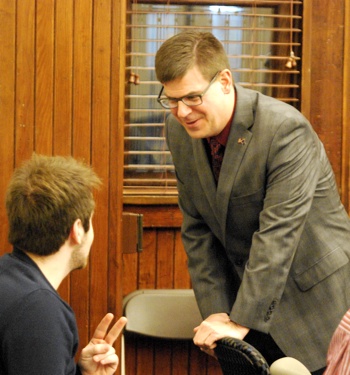
Dan Smith (R-District 2) talks with two Skyline High School students who were attending the Feb. 19 meeting as part of a class assignment.
Yousef Rabhi (D-District 8) agreed, noting that this is just the first step in a process of engaging the community. “I think the board’s dialogue needs to be parallel to the community’s dialogue,” he said. No one has proposed that the county build and run affordable housing, Rabhi said. If the county does decide to pursue affordable housing, it’s a matter of partnering with other organizations, he said. The county wouldn’t be able to do it alone.
Andy LaBarre (D-District 7), who chairs the board’s working sessions, said he’d be happy to add this as a topic for a future working session. He agreed with Rabhi that the county isn’t planning to run an affordable housing program. He emphasized that anything recommended by the advisory committee “would of course need board approval.”
LaBarre felt that some of the board’s conversation was “talking about this as if it’s happened” – but it hasn’t, he said.
Peterson joked that he was pleased when Dan Smith had made the motion to approve the Platt Road planning project, because as a Republican, Smith had “changed his spots” regarding the typical Republican stance toward affordable housing. “He’s just as close to a Democrat as he can be tonight, and I’m grateful for that,” Peterson said.
He then referred to Smith’s calling of the question, and described it as a “rude process to use.” He noted that the board spent less than 10 minutes talking about the disposal of land that’s worth at least $2 million – “and six of those minutes I took up,” he said. He cautioned against calling the question, when other commissioners still wanted to discuss the issue. He said if other commissioners wanted rude treatment, he was capable of that as well.
The property is worth millions of dollars, Peterson said, and deserves more discussion. If a developer is interested, he felt the board has basically closed the door on that possibility. “Let’s follow our policies – not by calling the question.”
Peterson concluded by saying he appreciated that Dan Smith supported this effort, adding that it was “good to have a Republican on our team.”
Appointments
Commissioners were asked to approve several appointments to various county board and committees. Nominations were brought forward by board chair Yousef Rabhi (D-District 8). Several openings remain and will be reposted on the county’s website.
The nominations made on Feb. 19 were:
- Act 88 Advisory Committee, for a term ending Dec. 31, 2014: Todd Clark.
- Community Action Board, for terms ending Dec. 31, 2016: Ivory Gaines (consumer); James Horton (consumer); Elizabeth Janovic (private sector); Jason Morgan (public sector).
- Local Emergency Planning Committee, for terms ending Dec. 31, 2016: Daniel Barbossa (broadcast media); Samantha Brandfon (hospital); Linda Dintenfass (first aid).
- Washtenaw Community Health Organization (WCHO), for terms ending March 31, 2017: Mark Creekmore and Linda King (county representatives).
- Washtenaw County/City of Ann Arbor Community Corrections Advisory Board, for a term ending Dec. 31, 2016: Judy Foy (communications/media).
Several openings remain, and have been reposted on the county’s website. Those include:
- Act 88 Advisory Committee: One position for a resident with experience in agriculture and/or tourism.
- Agricultural Lands Preservation Advisory Council: One position for an environmental/conservation group/natural resource professional.
- Community Action Board: One position for a consumer slot.
- Local Emergency Planning Committee: Several openings for people representing health and law enforcement (2), owner/operator of a Title III facility (2), firefighter (1), elected state official (1), first aid (1), civil defense for the city of Ann Arbor (1), transportation (1), print media (1), agricultural (1), and agricultural/Farm Bureau (1).
- Workforce Development Board: Two openings for people in the private sector.
Appointments: Board Discussion
Ronnie Peterson (D-District 6) asked for Todd Clark’s nomination to the Act 88 advisory committee to be pulled out for a separate vote.
Outcome on all appointments other than Todd Clark: The appointments were approved unanimously.
Peterson recalled that the board had discussed the creation of an Act 88 advisory committee, but he’d been under the impression that more details about it would be forthcoming.
By way of background, for the past few years the county has been levying a tax to fund economic development and agricultural activities, under Act 88 of 1913. The county’s position is that it is authorized to collect up to 0.5 mills under Act 88 without seeking voter approval. That’s because the state legislation enabling the county to levy this type of tax predates the state’s Headlee Amendment. The amount levied by the county in December 2013 was 0.07 mills, raising about $972,000 to fund Ann Arbor SPARK, heritage tourism, and the Detroit Region Aerotropolis, among other entities.
As part of developing the 2014-2017 budget, the county board approved a new policy for allocating Act 88 revenues at its Nov. 6, 2013 meeting. The policy was drafted by Conan Smith (D-District 9). [.pdf of Act 88 policy] The policy included creating an Act 88 advisory committee to make recommendations to the board and prepare an annual report that assesses how Act 88 expenditures have contributed toward progress of goals adopted by the board.
The policy also allows the committee to distribute up to 10% of annual Act 88 revenues without seeking board approval. That was the subject of some discussion on Nov. 6, 2013, with Dan Smith (R-District 2) noting that Act 88 authorizes only the board to direct how revenues are spent. Corporation counsel Curtis Hedger had told the board that by approving this policy, commissioners would be providing that direction – in essence, delegating it to the advisory committee.
The policy also allocated up to 30% of revenues to the county office of community & economic development, which administers Act 88 funding. The Nov. 6 vote on the Act 88 policy was unanimous.
During discussion on Feb. 19, Peterson said he didn’t recall passing a resolution that gave criteria for the advisory committee in determining how to allocate the Act 88 revenues.
Yousef Rabhi (D-District 8) responded, saying that the resolution creating the Act 88 advisory committee stipulated that the membership would include three commissioners and two residents – one least on of them having a background in agriculture or tourism.
Specifically, the policy adopted in 2013 outlined these guidelines regarding the advisory committee:
III. Act 88 Advisory Committee
a. An Act 88 Advisory Committee is created as a subcommittee of the Board of Commissioners and shall include three members of the Board as recommended by the Chair and approved a majority of the Board. The Committee shall have two additional residents of Washtenaw County, with at least one of those residents having expertise in agriculture and/or tourism. No recipients of Act 88 funds shall be a member of the Committee.
b. The Advisory Committee is charged with annually reviewing applications and recommending funding for Act 88 funds and overseeing and evaluating funding recipients.
c. As a committee of the Board of Commissioners, the Advisory Committee shall be governed by the Open Meetings Act.
d. The Advisory Committee shall annually prepare and present to the Board of Commissioners a report summarizing expenditures of Act 88 funds and assessing progress towards the goals adopted by the Board of Commissioners.
e. The Advisory Committee will annually recommend to the Board of Commissioners a process for evaluating applications that identifies priority outputs and includes a numerical scoring system for comparing applications.
f. The Office of Community and Economic Development will staff the Advisory Committee.
As he has in previous board discussions, Peterson expressed concern that the board was abdicating its responsibility to allocate funding. He said he could see supporting the work of the advisory committee if it were to develop criteria for allocating funds, which the board could then discuss and use in its own decisions. But he didn’t support having a committee that would receive grant applications on behalf of the board. He didn’t care who was appointed to the committee – the responsibility for allocating funds still rested with the board.
Conan Smith responded, saying that it was never the intent for the advisory committee to take on the board’s responsibilities. Rather, the role of the committee would be to recommend the criteria and priorities for allocating Act 88 funds, he said. The board would then need to adopt those criteria, Smith continued. The committee would then develop a scoring matrix, based on the board-approved criteria. After the board approved that scoring matrix, Smith said, the committee would collect applications from entities that seek funding, evaluate those applications, and make recommendations about which entities should receive funding. All of this would happen annually.
The board would retain complete control over those Act 88 funds, Smith said. To date, he noted, there hasn’t been an application process for funding. “I think that the committee has the potential to be very powerful and abuse its power, but I hope we put in enough oversight opportunities to make sure that doesn’t happen,” he said.
Peterson replied that the process Smith described sounded good, but he wondered where that was codified. There should be a document that clearly explains the committee’s charge, Peterson said, and that makes clear what the role of the committee is. Without that, he said he wasn’t comfortable voting for the appointment to the Act 88 committee.
Smith offered to amend the appointment resolution, incorporating the description of the committee that had been included in the policy passed by the board in November. His amendment included these elements as a charge for the committee: (1) annually reviewing applications and recommending funding for Act 88 funds and overseeing and evaluating funding recipients; (2) annually preparing and presenting to the board a report summarizing expenditures of Act 88 funds and assessing progress towards the goals adopted by the board; (3) annually recommending to the board a process for evaluating applications that identifies priority outputs and includes a numerical scoring system for comparing applications; and (4) recommending annual priorities for the use of Act 88 funds.
Peterson stressed the importance of stating that it was an advisory committee. Smith proposed adding a sentence to the advisory committee’s charge, stating that it’s an advisory committee to the board of commissioners and that the committee won’t be making decisions about the allocation of funds.
Outcome on amendment: It passed unanimously on a voice vote.
Dan Smith (R-District 2) made a motion to postpone the item until the March 5 meeting. Rabhi noted that one of the Act 88 committee positions was being reposted, and he didn’t expect a nomination would be made until March 19. So D. Smith withdrew his original motion, and moved to postpone until the March 19 meeting.
Outcome on postponement: The motion to postpone Todd Clark’s appointment to the Act 88 advisory committee until March 19 passed on a 5-1 vote, over dissent from Yousef Rabhi (D-District 8).
Marriage License Fees
A proposal giving authority to the Washtenaw County clerk/register of deeds office to reduce the fee for expediting marriage licenses under certain circumstances – from $50 to 1 cent – was on the Feb. 19 agenda.
Currently, the $50 fee is charged if applicants want to waive the statutory three-day marriage license waiting period. The resolution would authorize the county clerk, consulting with the county administrator, to establish a ”fee holiday” on the day preceding a period during which the office’s vital records division would be closed for four or more days, or when an unusual number of marriage license applicants are expected to appear. During a “fee holiday,” the charge for immediately processing a marriage license would be 1 cent.
According to a staff memo, waivers of the waiting period are requested between 5-15 times each month. Without a waiver, marriage licenses cost $20 per couple for Michigan residents, and $30 per couple for out-of-state residents – but the marriage must occur within Washtenaw County. More information is available on the county’s website.
Responding to a follow-up query from The Chronicle, county clerk/register of deeds Larry Kestenbaum reported that marriage license revenue is about $40,000 annually. Last year, 1,938 licenses were issued, compared to 1,830 in 2012.
Marriage License Fees: Board Discussion
Kent Martinez-Kratz (D-District 1) was concerned that by passing this resolution, the county board would be abdicating its responsibility for setting fees. He noted that the decision would be made by two individuals – the county clerk and county administrator. He said some of his constituents have indicated that the criteria for declaring a fee holiday are unclear. His sense is that this resolution was designed to help one particular group.
County clerk/register of deeds Larry Kestenbaum came to the podium to respond. He told commissioners that when he came into office, the fee for waiving the three-day waiting period was $5, based on a resolution adopted by the county board. [Kestenbaum was first elected as clerk/register of deeds in 2004.] He subsequently recommended that the board raise that fee to $50, and the board did that, he said.
It’s been the practice that when his office will be closed for a longer-than-normal period – like four days or more around the holidays – then his office would make some allowances for individuals who come in and want to get married before the office will reopen. He noted that the vital records office anticipates moving later this year to the space where the deeds office currently is, so the office will likely be closed for more than three days.
Kestenbaum said it’s come to his attention that under state statute, he doesn’t have the authority to waive that fee completely. The statute states that a fee, set by the county board, must be charged.
Kestenbaum was referring to this section of Michigan’s Public Act 128 of 1887:
551.103a Marriage license; time of delivery; solemnization of marriage required.
Sec. 3a. A marriage license shall not be delivered within a period of 3 days including the date of application. However, the county clerk of each county, for good and sufficient cause shown, may deliver the license immediately following the application. If the county clerk delivers the license immediately following the application, the person applying for the license shall pay a fee to be determined by the county board of commissioners, which the county clerk shall deposit into the general fund of the county. A marriage license issued is void unless a marriage is solemnized under the license within 33 days after the application.
So in consultation with his staff and some commissioners, including the board chair Yousef Rabhi (D-District 8), Kestenbaum said they came up with the idea to instead impose a 1 cent fee under certain circumstances. The fee would be dropped to a penny when someone needed an expedited process, through no fault of their own, he said.
Kestenbaum said that several years ago he’d asked to raise the fee for expedited processing to $50 because previously, people would just pay the $5 fee even if they didn’t need a quick turnaround. “The $50 was designed so that people would at least think about it before asking for it,” he said. Generally, people request an expedited process because they’ve forgotten to get the license, and the wedding is being held before the three-day waiting period, he noted.
The other circumstance that might result in dropping the fee, which Kestenbaum said he didn’t expect to happen, is when a larger-than-normal number of people apply for licenses at the same time. For example, last year, his office anticipated that a lot of people would want to get married right away because of a possible change in the state’s same-sex marriage law. He said he announced at that time that he intended to waive the fee, but “my authority to do that has been questioned.”
He subsequently looked at the state statute, which requires a fee to be set by the county board and charged – whether it’s $5, or $50, or 1 cent. “It’s your authority to do this,” he told commissioners.
At this point, Kestenbaum expects that various legal challenges to same-sex marriage bans will wind their way through the federal court system, and there will either be a decision that affects every state, or not, he said. “There would be nothing unique about Michigan, in that circumstance,” he said, “and there won’t be any anxiety that the court would change its mind.” That means his office is unlikely to see a sudden influx of requests for same-sex marriage licenses.
Realizing now that he doesn’t have authority to waive the fee, Kestenbaum said, he’s asking the board for these changes. He noted that the original draft had stated that a waiver would be made in consultation with the county board chair, but it had been suggested to him that the county administrator should be consulted instead, and he agreed to that change.
Martinez-Kratz said Kestenbaum had answered some of his questions, but he didn’t see the urgency to finalize the change that night. [Typically, resolutions are given initial approval at a ways & means committee meeting, on which all commissioners serve, and then the item is brought back for a final vote two weeks later, at a regular board meeting. This resolution was on the Feb. 19 agendas for both the ways & means committee and the regular board meeting that same night.]
Martinez-Kratz said fees should be appropriate to the community as a whole, based on the same rationale for everyone. Setting the fees at $50 but waiving them to 1 cent sometimes is like “ping pong,” he said. “That doesn’t sit right with me.” He wasn’t going to support the resolution, because he didn’t think it wasn’t setting fees appropriately for all members of the community.
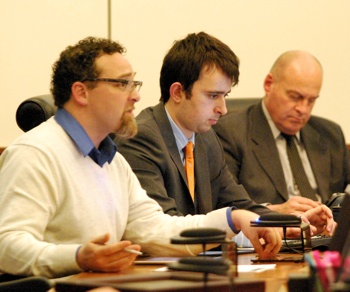
From left: County commissioner Conan Smith (D-District 9), Pete Simms of the county clerk’s office, and corporation counsel Curt Hedger.
Kestenbaum replied, saying that the overwhelming majority of people coming into the office to apply for a marriage license won’t be affected by the fee waiver change. He said that the state statute would allow the county board to decline to set a fee for an expedited process. In that case, everyone would have to wait three days. “I would be opposed to that,” Kestenbaum said, “but that’s within your authority.”
It’s optional for the board of commissioners to set a fee, he added. But if there’s a fee, his office must collect it.
Martinez-Kratz reiterated that the problem for him is the non-standard way in which the fee could be applied. He wasn’t concerned about the amount of the fee. “But you want the power from our board to at times assess it at $50 and at times assess it for a penny,” Martinez-Kratz told Kestenbaum.
Kestenbaum noted that the board has the authority to adjust the fees based on “administrative practicalities.” When someone is putting a burden on the office by needing the license to be typed, proofed and processed – and there’s a line of people waiting behind them – then “the $50 fee is to inhibit them from asking for that casually,” he said.
Conan Smith (D-District 9) said he totally agreed with the premise put forward by Martinez-Kratz. The fee should be set appropriately and used appropriately. But he heard from Kestenbaum that the actual cost of processing is more burdensome on the office when it’s done arbitrarily and you can’t plan for it, Smith said. So when the clerk’s office can see in advance that there’s likely to be an influx of license requests, the office can staff up appropriately for that. In that case, they shouldn’t need to charge an “excessive” fee, Smith said. It might happen after the office has been closed for a long period, he said, or it might be brought about by other circumstances – like people wanting to get married on Valentine’s Day. Smith said he thought the fee structure was thoughtful and addresses these conditions.
Outcome: The proposal was approved on two 5-1 votes at both the ways & means committee meeting and at the regular board meeting later that evening. In both cases, Kent Martinez-Kratz (D-District 1) cast the only dissenting vote. Three commissioners – Felicia Brabec (D-District 4) Alicia Ping (R-District 3), and Rolland Sizemore Jr. (D-District 5) – were absent.
Dental Clinic
Final approval for new dental clinic for low-income residents of Washtenaw County was on the Feb. 19 agenda. The project had received initial approval on Feb. 5, 2014.
The project is estimated to cost $1.5 million, using funds from the public health Medicaid liability account ($814,786), the public health fund balance ($663,015) and Washtenaw Health Plan ($50,000). According to the county’s public health staff, 58,000 county residents either don’t have dental insurance or on Medicaid dental insurance. However, only a few private dentists accept Medicaid. When up and running, the dental clinic is expected to serve 6,000 patients annually, including residents with income at up to 200% of the poverty level.
It’s expected that federal matching funds would supplement Medicaid reimbursement rates to provide a sustainable long-term cash flow, according to a staff memo. [.pdf of staff memo]
The resolution authorizes contract negotiations with the nonprofit Michigan Community Dental Clinics Inc. to run the clinic and with St. Joseph Mercy Health System, which would contribute space at its Haab Building in Ypsilanti at little to no cost.
Staff from the county’s public health department attended the Feb. 19 meeting, but did not formally address the board.
Outcome: Without discussion, the resolution was approved on a 5-1 vote over dissent from Dan Smith (R-District 2). Three commissioners – Felicia Brabec (D-District 4) Alicia Ping (R-District 3), and Rolland Sizemore Jr. (D-District 5) – were absent.
“Prescription for Health” Grant
A resolution on the Feb. 19 agenda was for initial approval to apply for accept a two-year $226,357 ”Prescription for Health” grant from the Kresge Foundation. It will fund a part-time staff position and requires a $54,250 match from the county’s public health department.
The county had previously received funding for this program, in the form of a two-year, $361,519 Kresge grant from Jan. 1, 2011 through Dec. 13, 2012. According to the program’s website, the purpose is ”to increase fruit and vegetable consumption among patients with low income, and to build capacity of clinics to expand the traditional medical model to include the food system.” The program also aims to strengthen relationships between clinics, farmers markets and the local food system. [.pdf of grant application]
According to a staff memo, analysis of feedback from 930 participants in 2011-2012 showed the following results:
Both years, the average daily consumption of fruits and vegetables increased by nearly one cup per day among patients who visited their local farmers market as measured by a pre- and post-program survey.
Participants overwhelmingly agreed that visiting the farmers market helped them and/or their family members eat more fruits and vegetables (96% Year 1; 94% Year 2).
Participants increased their awareness of other resources in the community. Both years, the number of participants who said they were aware that food stamps (Bridge/EBT cards) could be used at local farmers markets greatly increased from pre- to post-program (48% difference from pre to post Year 1; 43% difference Year 2).
Participants indicated that they were very likely to visit the farmers market again in the future at the conclusion of the program (98% Year 1; 97% Year 2).
The program had a positive economic impact on the local farmers markets, generating over $26,000 in new sales ($5,967 Year 1; $20,279 Year 2). Prescription for Health represented 9% of total sales at the Downtown Ypsilanti Market and accounted for 23% of the total sales at the Chelsea Bushel Basket Market.
Outcome: Without discussion, commissioners gave initial approval to this grant application. A final vote is expected on March 5.
Communications & Commentary
During the Feb. 19 meeting there were multiple opportunities for communications from the administration and commissioners, as well as public commentary. In addition to issues reported earlier in this article, here are some other highlights.
Communications & Commentary: Gravel Mining
Yousef Rabhi (D-District 8) highlighted a proposal by McCoig Materials Inc. to do gravel and sand mining in Lyndon Township, near Chelsea.
He said he’s very concerned about this for the environment in Washtenaw County, and plans to learn more about the proposal. He said he’s likely to oppose it, because it’s near one of the “jewels” of parkland in the county – the Pinckney State Recreation Area and Waterloo Recreation Area. There are also county parks in that area too, he said. “I think it would be very damaging to the future of our community, Washtenaw County’s recreation opportunities, and the environment as a whole to allow that project to move forward,” Rabhi said. It would also impact the quality of life in Chelsea, with gravel-hauling trucks going through the city, he added.
Rabhi said about 200 people had shown up to a public hearing earlier in the month, and he hoped to be involved in the process as it moves forward.
The site is located on M-52 across from Green Lake. Another public meeting is scheduled for Thursday, March 13 at 7 p.m. at the Washington Street Education Center Auditorium, 500 Washington St., 100 Building in Chelsea.
Communications & Commentary: Road Commission
Yousef Rabhi (D-District 8) reported that he’d received a letter from the Sharon Township supervisor, Peter Psarouthakis, indicating that the township’s board of trustees had voted not to support efforts to dissolve the Washtenaw County road commission.
By way of background, at their Oct. 2, 2013 meeting, commissioners created a seven-member subcommittee to “explore partnerships and organizational interactions with the Washtenaw County Road Commission.” Members appointed at that time included four county commissioners: Alicia Ping of Saline (R-District 3), Conan Smith of Ann Arbor (D-District 9), Dan Smith of Northfield Township (R-District 2) and Rolland Sizemore Jr. of Ypsilanti Township (D-District 5). Ping serves as chair. Other members include three township supervisors: John Stanowski of York Township, Ken Schwartz of Superior Township and Pat Kelly of Dexter Township. For more details about this work, see Chronicle coverage: “Group Explores Road Commission’s Future.”
The subcommittee’s most recent meeting was on Saturday, March 1 at 9 a.m. in the county administration building, 220 N. Main St. in Ann Arbor. During the 2.5-hour session, the group voted to recommend that the duties and responsibilities of the road commission should not be transferred to the county board of commissioners. Ping told The Chronicle after the March 1 meeting that unless given further direction from the board, the subcommittee’s work is done.
Communications & Commentary: Tax Increment Financing (TIF)
Andy LaBarre (D-District 7) reported that a committee has been working on policy recommendations regarding tax increment financing (TIF) projects, and will be bringing forward its recommendations soon.
Yousef Rabhi (D-District 8) thanked LaBarre for “throwing yourself on a grenade there for us.”
The county’s need for a policy to guide decisions related to TIF proposals was discussed last year in the context of Pittsfield Township’s State Street corridor improvement authority (CIA), which the county board agreed to participate in. From Chronicle coverage of the board’s Nov. 20, 2013 meeting:
Ronnie Peterson (D-District 6) asked whether a policy would be developed to guide the review of TIF proposals when they come forward. The board had previously discussed that approach. He noted that the board’s vote on the Pittsfield Township CIA still stands, and he’s in support of that. But a lot of questions have been raised by other commissioners, he added, and any community could come forward with the same kind of TIF proposal.
Board chair Yousef Rabhi (D-District 8) said he’s spoken to staff members who are working on a policy. The staff from the county’s equalization department, the office of community & economic development, and the brownfield authority board are collaborating to develop a TIF policy. He hoped that staff would have something for the board to review later this year or in early 2014. It’s important to have a good rationale for approving these agreements, Rabhi said.
Communications & Commentary: Public Commentary – GEDs
During the evening’s first opportunity for public commentary, Allison Tucker of Manchester spoke about the GED (general education diploma), saying she wanted to share some insights about how the GED can improve society. She said she was a GED graduate, and it’s helped her tremendously. She’s able to attend college now and subsequently will have more job opportunities. The GED is essential to the economy, she said, because it allows people who have aged out of school to continue working when new educational requirements are imposed. Children of graduates are less likely to be taken into a foster program due to having parents who aren’t able to provide for them.
The GED should be more affordable, Tucker said, because it’s essential for people who are in a bad financial situation, if they want to improve their lives. It can provide a second chance for people with substance abuse issues or who are ex-prisoners to discontinue their cycle of self-harm and build a better future, she said. Tucker concluded that the GED is a great way to improve the economy, people’s skills and general lives, because the most effective way to do all these things is through education. It’s time for the stigma around the GED to stop, and for it to be presented as what it is, she said: A stepping stone in life.
In responding to Tucker’s commentary, Conan Smith (D-District 9) thanked her for raising this issue. He reported that Washtenaw County is in the early stages of a regional effort that also involves Livingston and Jackson counties to look at how adult education is delivered. For a lot of people, the system is difficult to access, he said, because it’s fragmented in terms of where services are delivered. He said he was in a meeting recently about this with Mary Jo Callan, the county’s director of the office of community and economic development, and the issue of certification programs also was addressed. Such programs should step beyond what the GED has to offer. He told Tucker that if she’s interested, the county could find a way for her to be involved in this project.
Yousef Rabhi (D-District 8) also thanked Tucker, and noted that he’d met her at a recent YouthSpeak forum that was held in the county administration building earlier this year. Elected officials had come to hear students speak about their experiences and to give suggestions for improving the education system.
During the second opportunity for public commentary, Bonnie Truhn, a Milan resident, said she was there to support Tucker, who is in the adult transitions program at Washtenaw Community College. Truhn is manager of that program. She noted that Tucker had spoken at the recent Washtenaw Alliance for Children & Youth (WACY) event, and had been encouraged to share her views with the county board, too. The program at WCC is not just for GED, Truhn said. It’s a career guidance program, and she thought commissioners would agree that this is what they want for the county. People should fully understand the challenges that are faced by students as well as those who are trying to provide instruction in the program. It’s important to provide opportunities for people who will earn their GED, as well as for those who won’t earn it, Truhn said, but who also need jobs.
Andy LaBarre (D-District 7) replied that Truhn’s comments are well-received. He noted that Jason Morgan, WCC’s director of government relations, was attending the meeting for another reason. [Morgan was appointed during the meeting to the county's community action board.] LaBarre said he was sure that Morgan would take back Truhn’s remarks to the WCC administration.
Ronnie Peterson (D-District 6) said that sometimes people wonder how their tax dollars are spent. Someone like Tucker shows that the county is able to lend support to “those who sometimes have those trips and falls along the way,” Peterson said, and to make sure they had a second chance.
Communications & Commentary: Misc. Public Commentary
Thomas Partridge complained about the huge amounts of snow that had piled up at intersections and parking lots. He advocated for a countywide public transit system, and more funding for education, services for homelessness, and affordable housing. Partridge also called for a countywide public art program. He urged commissioners to address these issues.
During the evening’s second opportunity for public commentary, Partridge called for a more people-friendly democratic society, and to fully fund affordable housing. He asked how a county as wealthy as Washtenaw County could stand by when there are so many people who can’t afford a place to live. There needs to be a countywide affordable housing commission to address this problem, he said, as well as a countywide affordable public transportation commission, and a countywide justice commission to oversee the courts.
Present: Andy LaBarre, Kent Martinez-Kratz, Ronnie Peterson, Yousef Rabhi, Conan Smith, Dan Smith.
Absent: Felicia Brabec, Alicia Ping, Rolland Sizemore Jr.
Next regular board meeting: Wednesday, March 5, 2014 at 6:30 p.m. at the county administration building, 220 N. Main St. in Ann Arbor. The ways & means committee meets first, followed immediately by the regular board meeting. [Check Chronicle event listings to confirm date.] (Though the agenda states that the regular board meeting begins at 6:45 p.m., it usually starts much later – times vary depending on what’s on the agenda.) Public commentary is held at the beginning of each meeting, and no advance sign-up is required.
The Chronicle could not survive without regular voluntary subscriptions to support our coverage of public bodies like the Washtenaw County board of commissioners. Click this link for details: Subscribe to The Chronicle. And if you’re already supporting us, please encourage your friends, neighbors and colleagues to help support The Chronicle, too!




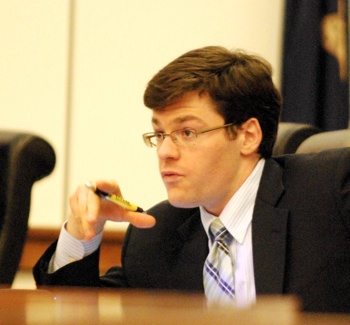
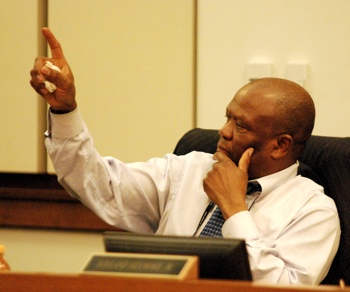
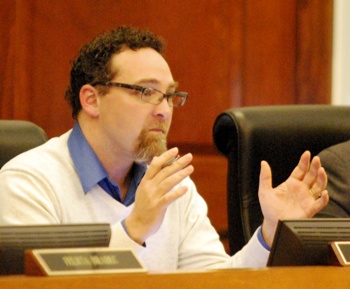
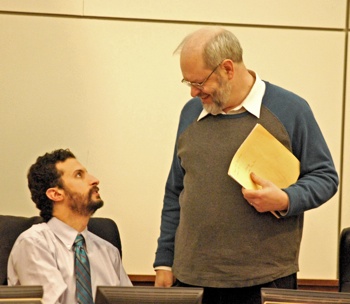
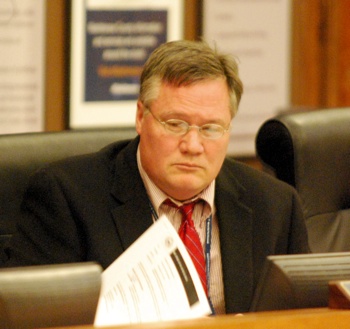
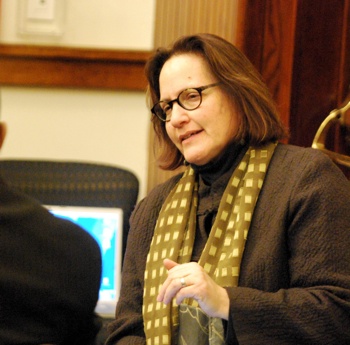

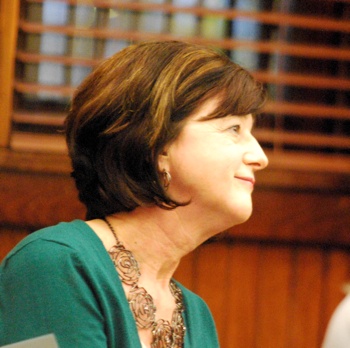
Thanks, Mary, for the – again – thorough reporting.